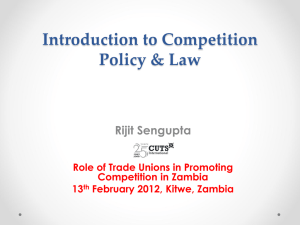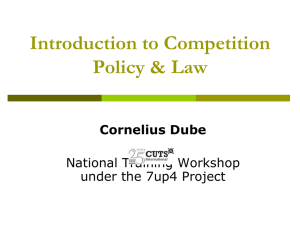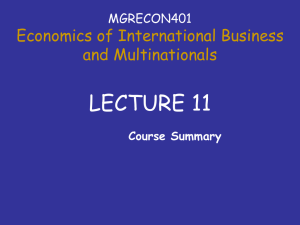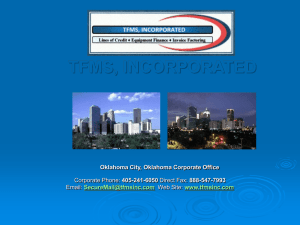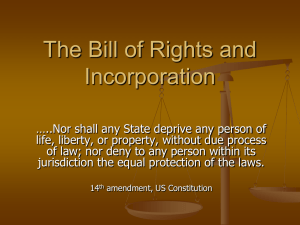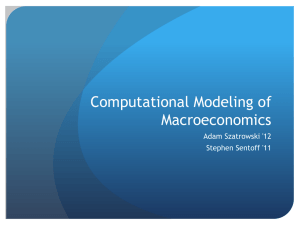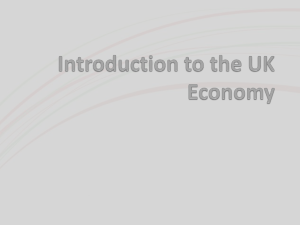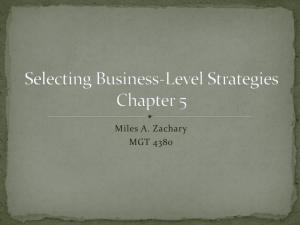Global Incorporated - Missouri State University
advertisement
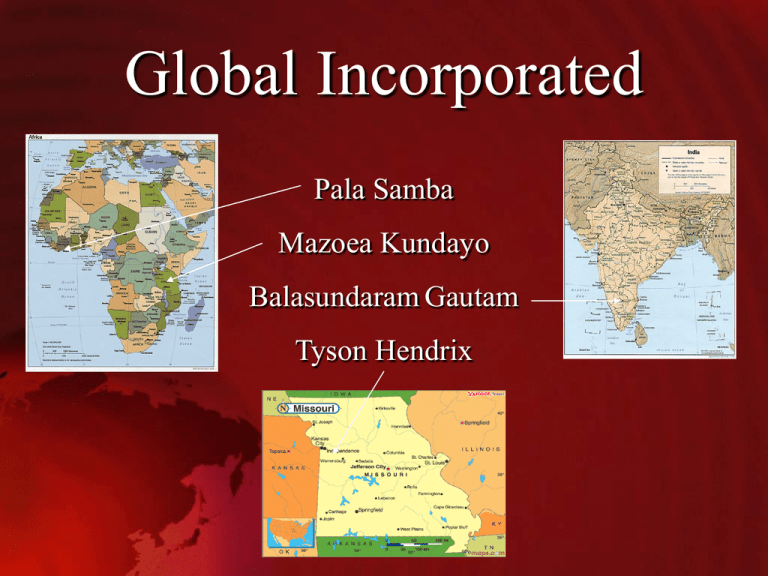
Global Incorporated Pala Samba Mazoea Kundayo Balasundaram Gautam Tyson Hendrix Global Incorporated The Growth of Multinationals & The Internationalization of Accounting Firms Global Incorporated History of the Growth of Multinationals • 1880 – 1930 – Raw materials – United Kingdom dominance • 1930 – 1940 – Great Depression – World Wars • 1950’s – Emergence of United States • 1980’s – Growth of Asian Countries Global Incorporated Jones’ Factors • • • • • Overall Macro Economic Conditions Receptivity to Foreign Companies Capital Liberalization Trade Protectionist Policy Transportation and Communication Global Incorporated Multinationals and Natural Resources • Mining Industry • Petroleum and Oil • Outsourcing – Human Resources Global Incorporated Organizations • World Bank – July 1st, 1944 – IBRD & IDA For – Fund Generation – Loans – Grants Against - Loans not Aid - One size fits all • WTO – January 1st, 1995 - GATT For – WTO agreements – Trade negotiations – Trade disputes Against - Big Boys - Free trade not in best interest - Agriculture Global Incorporated Organizations • IMF – July 1st,1944 Do’s – International Monetary Cooperation – Growth of International Trade Don'ts – Dominated by Large players – Keynesian approach • OECD – 1961 – Provide data, analysis and forecasts – Compare experiences – Co-ordinate Policies – Foster open trade Global Incorporated International Mergers and Acquisitions • International mergers and acquisitions have grown at tremendous rate • The overall merger activities represented by cross region are approximately to be 17% to 19% • Most significant cross-border mergers that have occurred are those of, BP’s mergers with Amoco and DaimlerBenz’s merger with Chrysler Global Incorporated International Mergers and Acquisitions • Business factors that contributed the increase crossborder mergers and acquisitions -Pressures of international competition financial innovation -Economic growth and expansion -Political and economic integration -Technological changes -Deregulation and Privatization Global Incorporated International Mergers and Acquisitions • Positive effects of mergers and acquisitions – New or advanced technology is transferred to the country and to the company acquired – New management practices are introduced in the areas of finance, marketing, human resources etc. – The subsidiary gains access to new sources of capital – The acquisition overcomes market entry barriers, reduces industry concentration levels stimulates competition – Subsidiary exports are increased through gaining access to wider international distribution channels and the introduction of new products. Global Incorporated International Mergers and Acquisitions • Other reasons for the Increase of Cross-Border Mergers and Acquisitions – Political Stability – Political stability and regulatory climate has been favorable in recent years – Technological and Regulatory Changes – cellular technologies – Globalization of Industries and Markets – Easy access to global market Global Incorporated Joint Ventures • A cooperative partnership or joint venture is another strategy that has contributed the growth of multinationals – Cross-border joint venture contributed to the market integration – Help a company to strengthen its ability to penetrate, compete in, and integrate in global markets – Bypass trade regulation and trade barriers Global Incorporated Joint Ventures • International joint ventures are preferred by multinationals because of the following advantages: – Access to well-established distribution networks – Access to established customer base – Lower capital outlay than mergers and acquisitions – Rapid returns – Good creation of awareness and brand image – Local partners provide ‘know-how’ and market understanding – Established demand through cross-selling to partner – Easier to deal with local authorities Global Incorporated Privatization and Deregulation • Deregulation and adaptation of privatization policies – Transforming economies to a market structure – Rapid transfer of enterprises from state to private ownership – It provides opportunity to multinationals to enter into new market and expand their operation by acquiring state-owned companies Global Incorporated Strategic Business Alliances • In 1990s strategic business alliances contributed tremendously in the growth of multinationals – Especially in the service sector – Essential for firms to survive and prosper in the intensifying global competition • Alliances are popular because mergers and acquisitions are not possible due to authority regulation and government ownership Examples: – KLM & Northwest Airlines – British Airways & USAir Global Incorporated Internationalization of Accounting firms • The growth of multinationals have lent support to the expansion of services such as Accounting services • Accounting firms overseas can traced back to the investments in North America and Asia in the 18Th & 19th century • The movement took on a new meaning after WWII as firms strived for breakthrough to better serve their clients Global Incorporated Internationalization of Accounting firms • Reasons • “Accounting Firms may internationalize because their clients internationalize”- Henk Post • This is a simplistic approach but there are others reasons explaining the trend. Global Incorporated Internationalization of Accounting firms • Reasons • The Desire to protect relationships with their home-based clients • The exploitation of information asymmetries between buyers and sellers of services • The transfer of competitive advantage to another country • The competition amongst Accounting firms – Mergers and acquisitions in the 1980’s – Big Eight, Big six, Big four Global Incorporated Internationalization of Accounting firms • Entry Mode – A relationship between motive and entry mode – Accounting services are demander-located, the movement on the part of supplier. – The level of involvement indicates the entry mode chosen – The consensus is Foreign Direct Investment is the main form of entry. Global Incorporated Internationalization of Accounting firms • Accounting firms as Multinationals ? • International Accounting firms are not multinational corporations but multinational networks • Hybrid structure with no equity base and financed through cost-contribution system – Less management problems • Bilateral cooperation to come with collective international business or marketing plan Global Incorporated Internationalization of Accounting firms • Common features with MNCs – Strategic and global thinking – A combination of internationally integrated operations to remain competitive in the area of globalization • Challenges for the international accounting firms – The consistency of delivery of core services – A stronger commitment to maintain a level of world wide quality. Global Incorporated Regulation & Influence • • • • • • Many Separate Bodies throughout the World Most Influencing Body – SEC IASB & IAASB IOSCO IFAC Other Boards and Committees Global Incorporated Regulation & Influence International Accounting Standards Securities Exchange Commission (SEC) – – – – Within the United States Working with many securities regulators around the world Encourage high quality accounting and auditing standards Enhance consistent application and enforcement of standards Global Incorporated Regulation & Influence International Accounting Standards International Accounting Standards Board (IASB) – Main body in establishing international accounting standards – Reconstructed in 2001, now serves as full time – Global accounting influence – Along with FASB International Auditing & Assurance Standards Board (IAASB) – Main body in developing international auditing and assurance standards – Develops standards in accordance with IASB’s International Accounting Standard – Works alongside the Ethics Committee (EC) to develop high quality standards Global Incorporated Regulation & Influence International Accounting Standards International Organization of Securities Commission (IOSCO) – – – – Developed in 1983 Committed to promoting high standards of regulation Looks over the IASB and the IAASB Members comment on the projected standards and interpretations International Federation of Accountants (IFAC) – Worldwide organization for the Accounting Profession – Sets international standards in Auditing, Education, Ethics, and Public Sector Financial Reporting – Works along with other regulating and influential bodies Global Incorporated Regulation & Influence International Accounting Standards Other Organizations with Power to Regulate and Influence 1. 2. 3. 4. 5. World Bank Committee of European Securities Regulators (CESR) European Commission Ethics Committee (EC) Many Accounting Industry and User groups that deal with issues outside their country’s boundaries Global Incorporated Skills & Qualifications International Accounting is a fairly new concept – Proper education and training have yet been implemented – Regulations have not been set – Accountants with International Experience are rare A SEC Presentation Understanding Financial Infrastructure for Globalization “As we enter 2005, there are not many people in the world that could consider themselves “experts” or even “experienced” with IFRS.” “Substantial training, open communication and information sharing about IFRS application will be needed to facilitate the growth and evolution of experience and knowledge.” Global Incorporated Skills & Qualifications Skills and Qualifications needed to Implement IFRS 1. Great Deal of Specialized Education • 2. 3. 4. Also with new standards the issue of Continuing Education comes into play Ability to acquire application of the IFRS Interpretation Constant Regulation Global Incorporated Skills & Qualifications Major Issues Concerning International Accounting 1. 2. Language and Cultural Barriers Different GAAP’s regulating separate countries • Must have knowledge of each 3. 4. 5. Many accounts are recorded differently between countries Auditing Standards Variances in a country’s set of ethics and professional judgment standards Global Incorporated Major Players Key International Players in the development of International Accounting Standards – – – – World Trade Organization (WTO) SEC European Union (EU) United Nations (UN) Global Incorporated Major Players Issues regarding these Key Players – SEC and the FASB – not cooperating with the EU • Both want new Standards bassed off their own set standards – SEC – thinks new standards wont be implemented very rigerously • Wants strick system with little flexibility – IASB followers believe flexibility is a positive – EU’s main objective is to keep EU rules in line with International Accounting Standards Global Incorporated
